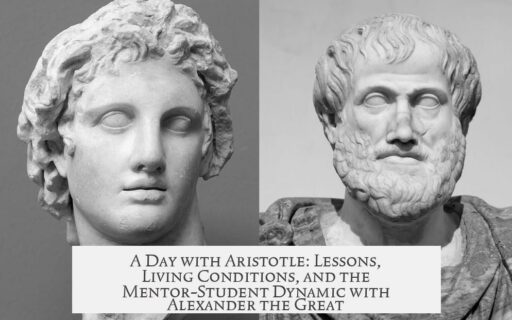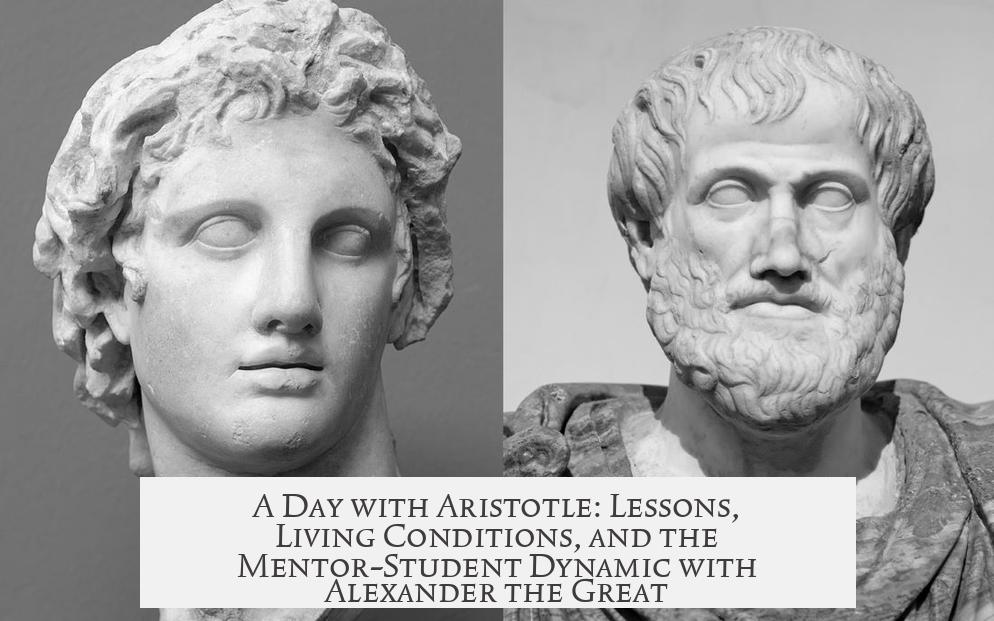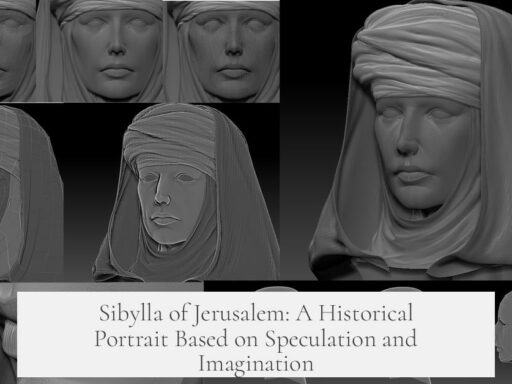Aristotle tutored Alexander the Great from the age of 13 to 16, focusing on a broad curriculum essential for a future ruler. A typical day would include lessons in history, medicine, metaphysics, psychology, politics, ethics, art, mathematics, astronomy, and poetry. However, Aristotle emphasized metaphysics, logic, politics, and ethics, prioritizing the last two due to their importance for governance.
Despite the complexity of metaphysics and logic, Aristotle likely simplified these concepts for Alexander, stressing core ideas rather than detailed theory. For politics and ethics, Aristotle shaped Alexander’s understanding of ruling justly and ethically within the framework of the polis, the city-state community. Aristotle championed the polis as the natural political community, but his teachings on this topic clashed with Alexander’s growing megalomania and his father Philip II’s undermining of traditional polis structures.
Ethics played a significant role. Aristotle admired magnanimity, a virtue Alexander embraced, considering himself the “magnanimous man.” This ideal depicted a supreme ethical figure whose actions were justified by greatness. Such teachings influenced Alexander’s self-perception, though practical adherence to Aristotle’s political ideals was limited.
Alexander’s education took place in a possibly secluded location—tradition hints at a quiet mountain setting away from the Macedonian capital to ensure privacy and concentration. During lessons, Alexander was accompanied by the ‘Companions,’ other noble youths undergoing their training, fostering peer learning among future leaders.
Regarding Aristotle’s living conditions, no explicit records exist. Yet, tutoring the king’s only son came with comfortable living standards. Aristotle’s compensation was notable; part of his payment involved Philip II restoring Aristotle’s destroyed hometown, Stageira, including freeing its enslaved citizens. This gesture suggests substantial royal favor and tangible rewards beyond direct monetary pay.
Aristotle’s teaching style was more professorial than pedagogical. Unlike Plato’s literary and dialogic approach, Aristotle was less naturally inclined to simplify ideas for young students. This contrast might have affected Alexander’s engagement with certain abstract subjects.
The relationship between tutor and pupil was complex. Despite initial respect, Alexander grew distant and eventually despised Aristotle, even issuing written threats. This tension likely arose after Alexander executed Aristotle’s grandnephew under accusations of treason. Their diverging views and personalities prevented a harmonious bond. Aristotle’s traditional polis-centered political vision conflicted irreconcilably with Alexander’s imperial ambitions.
| Aspect | Details |
|---|---|
| Subjects Taught | History, medicine, metaphysics, psychology, politics, ethics, art, math, astronomy, poetry |
| Core Focus | Ethics, politics (for rulership), simplified metaphysics and logic |
| Learning Setting | Likely outside Macedonian capital; accompanied by noble peers (the Companions) |
| Living Conditions | Comfortable; tutor to royal heir |
| Payment | Reconstruction and liberation of Aristotle’s hometown Stageira by Philip II |
| Relationship | Deteriorated over time; Alexander distanced himself and opposed Aristotle’s views |
Aristotle’s role was crucial in shaping Alexander’s intellectual foundation. He offered foundational knowledge on governance, ethics, and philosophy. Alexander’s later actions, however, reflected selective adherence informed more by ambition than by Aristotle’s ideal political concepts. The tutor-student dynamic was layered with respect, disagreement, and eventual estrangement, underscoring the challenges of educating a future empire-builder.
- Aristotle taught a broad curriculum with emphasis on ethics and politics.
- Alexander learned alongside noble peers in a likely private setting.
- Aristotle’s living conditions were comfortable; pay included privileges linked to his hometown.
- The tutor-student relationship became strained over political and personal differences.
- Alexander adopted some ethical concepts but diverged from Aristotle’s political ideals.
Aristotle Tutored Alexander the Great: A Day in the Life of History’s Most Famous Tutor-Student Duo
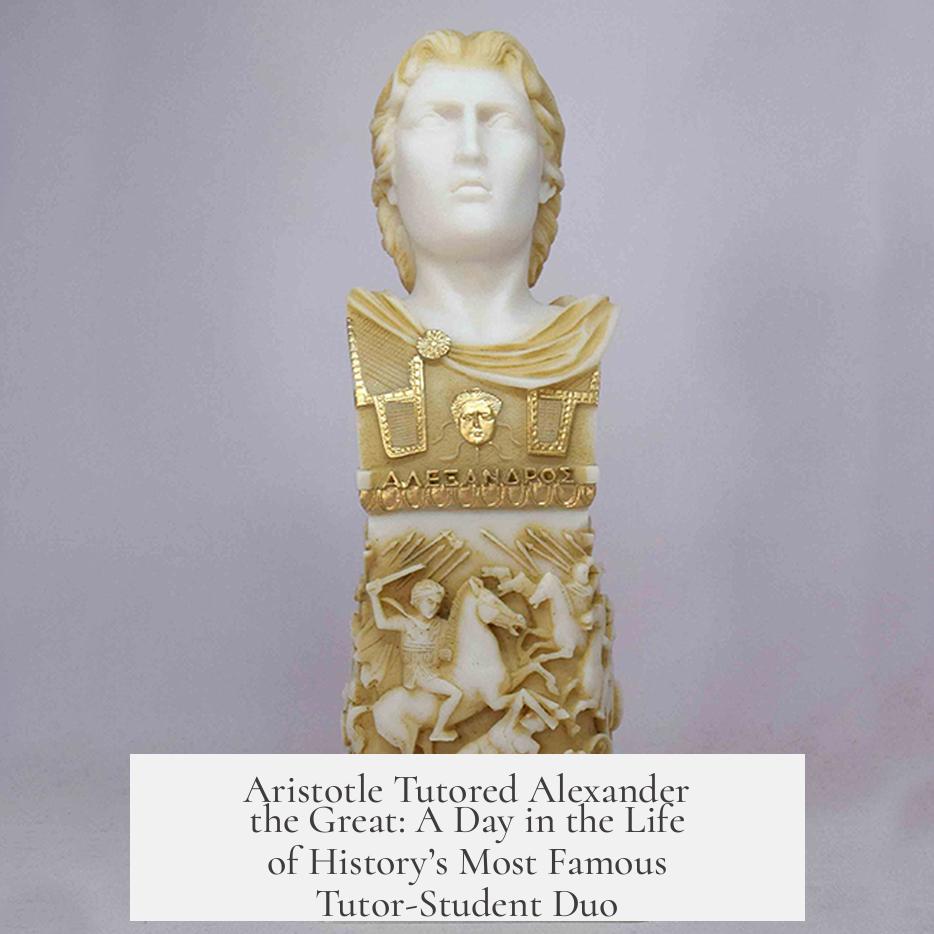
What did a typical day of lessons with Aristotle and Alexander the Great look like? How did Aristotle live and what was he paid for instructing a future emperor? Let’s unravel this fascinating chapter in history with all the juicy details you never heard in school.
You might imagine Aristotle coaching Alexander in a grand palace hall, surrounded by scrolls and medieval dry erase boards. Close! But it wasn’t quite that simple.
The Daily Lesson Plan: From Metaphysics to Poetry
Aristotle’s tutoring covered an impressive range of subjects. Picture this: history, medicine, metaphysics, psychology, politics, ethics, art, math, astronomy, and poetry all crammed into daily lessons. The man was the ultimate polymath.
Yet, amidst this smorgasbord of knowledge, the real emphasis was on metaphysics, logic, politics, and ethics. Aristotle believed these would shape Alexander’s mind beyond brute strength—especially politics and ethics, since they mattered most to a ruler.
Imagine Aristotle trying to explain metaphysics to a teenager. Tough crowd! He probably confined himself to core ideas, knowing complex nuances were over Alexander’s head. Politics and ethics were a different story. These were front and center because Alexander had a kingdom (or empire) to run.
Ethics: The Seed of a Magnanimous Man—or a Megalomaniac?
Aristotle’s ethics likely left a big impression on Alexander. The king-to-be absorbed the idea of the magnanimous man—someone who is noble and supreme in virtue, whose actions are always justified.
Funny how Aristotle’s lofty moral principles might have provided Alexander a fancy excuse to justify his world-conquering zeal. Sounds like a philosopher’s gift gone wild.
The Clash of Polis vs. Empire
Aristotle revered the polis, or city-state, as the natural political community. This view was deeply rooted in Greek tradition. However, Alexander had bigger plans—an empire, not a petty city-state. His ambitions blatantly clashed with Aristotle’s idealism.
This disconnect shows Aristotle missed Alexander’s megalomania. Plus, Philip II, Alexander’s father, had already undermined the polis system. Alexander’s rise effectively buried the political concept Aristotle cherished for over a millennium.
Living in Style: Aristotle’s Comfortable Existence
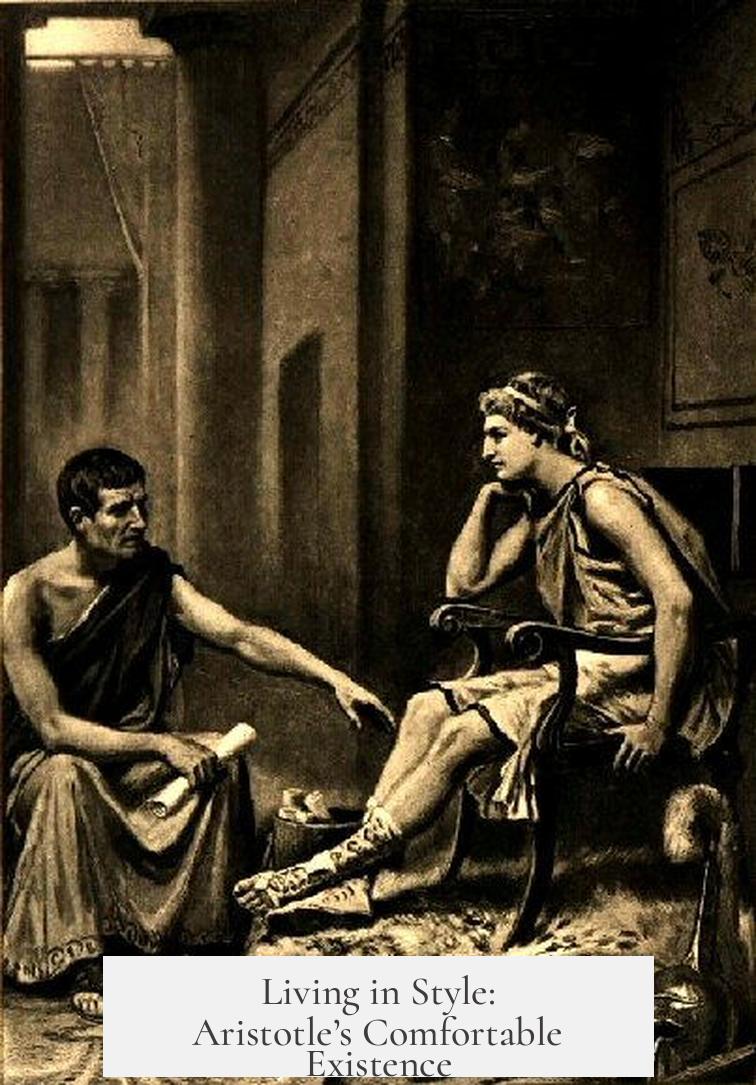
No ancient receipts tell us exactly where Aristotle lived during tutoring, but guesswork and context suggest his lifestyle was quite comfortable. You don’t teach a king’s only son and live in penury.
As part of his reward, Philip II rebuilt Aristotle’s hometown, Stageira, in northern Greece—a place Philip had previously destroyed during his campaigns. He also freed its enslaved citizens, an extraordinary gesture suggesting respect and significant payment for Aristotle’s services.
Teaching Style & Environment: Lessons Away From the Macedonian Court
Aristotle was probably no superstar teacher for kids. Unlike Plato, he lacked literary flare and might have been a bit dry for youthful minds. More professorial and less entertaining, he nevertheless tackled the task from age 13 to 16—a critical period before Alexander became regent.
Alexander wasn’t a lone scholar. He learned alongside noble peers called the Companions. This group dynamic likely made lessons lively yet competitive.
Some sources suggest Aristotle moved Alexander and his companions to a private mountain retreat away from the bustling Macedonian capital. This escape probably fostered focus and privacy for philosophic inquiries, though historians debate the exact location.
When Tutor and Student Collide: Relationship Deterioration
The Aristotle-Alexander partnership didn’t end in a warm hug. Over time, the relationship went sour. Alexander despised Aristotle in his later years and even sent him written threats. Some conspiracy theories speculate Aristotle had a role in Alexander’s mysterious death—though there’s no solid proof.
One sticking point? Alexander executed his own grandnephew, a move Aristotle deeply resented, viewing it as a betrayal of moral code.
Fundamentally, Aristotle and Alexander had opposing worldviews. While Aristotle favored the traditional Greek polis and ethical restraint, Alexander aimed for vast empire-building, power, and conquest.
What Can We Learn From This Tutoring Saga?
- Multi-subject education beats single-focus drills. Aristotle’s range suggests powerful leaders thrive on broad knowledge.
- Philosophy isn’t just abstract—it’s political and practical. Aristotle’s ethics and politics shaped Alexander’s ideas on leadership, for better or worse.
- Teachers and students often clash. Even great minds can’t always align values, showing education is a two-way street.
- Rewards go beyond money. Aristotle’s recompense included rebuilding a city and social status—something modern educators rarely get.
So, next time you wonder about tutoring royalty, picture Aristotle in a mountain retreat, juggling the metaphysical with cavalry tactics, debating ethics with a future conqueror who’s already dreaming bigger than the Greek city-state. Lesson learned: education can be revolutionary—and messy.
What subjects did Aristotle teach Alexander the Great during their lessons?
Aristotle covered a wide range of topics. These included history, medicine, metaphysics, psychology, politics, ethics, art, math, astronomy, and poetry. His main focus was on politics and ethics, subjects important for a future ruler.
What was a typical day like during Alexander’s lessons with Aristotle?
Alexander studied from age 13 to 16, often with other noble youths called the Companions. Lessons took place in a more private setting, possibly away from the capital. Aristotle emphasized ethics and politics but introduced basic metaphysics and logic.
What were Aristotle’s living conditions and payment while tutoring Alexander?
Aristotle lived comfortably, as tutors to royal heirs were well cared for. His payment included Philip II rebuilding Aristotle’s hometown, Stageira. The city was restored and its citizens freed after prior destruction by Philip.
How did Aristotle’s teaching style suit a young Alexander?
Aristotle was a scholarly teacher, not naturally gifted with literary flair. He likely simplified tough subjects like metaphysics. Politics and ethics received more attention to prepare Alexander for leadership roles.
Did Aristotle and Alexander get along during the tutoring period?
Their relationship later turned sour. Alexander sent Aristotle written threats after executing his grandnephew, showing a deep personal conflict. Their differing views and personalities caused tension despite Aristotle’s influence.
